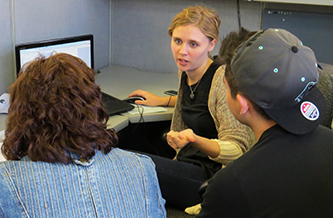Sharing insight on three common misconceptions about social work, and the important role social workers play in advocacy and support of our neighbors
 Social work, despite being a widely recognized field, is quite often misunderstood, which can yield a few misconceptions. With March being National Social Work Month, we wanted to shine a light on a career that 650,000 people in our country have dedicated their lives to and bring awareness to the heart behind the work.
Social work, despite being a widely recognized field, is quite often misunderstood, which can yield a few misconceptions. With March being National Social Work Month, we wanted to shine a light on a career that 650,000 people in our country have dedicated their lives to and bring awareness to the heart behind the work.
“Social work means helping individuals who need extra support to get through a difficult time in their life,” shares NVFS’ Treatment Foster Care case manager Sarah Young, MSW. “I am a part of a team of individuals who truly care to see the best outcomes for the populations we serve, advocate for our children’s needs and be someone our children can look to for help, guidance and friendship when they feel alone.
“Social work is the most stressful, emotionally investing and rewarding work I’ve ever done.”
- It’s not as transactional as it may appear. A common misconception about social work, particularly in the field of foster care, is that the interaction between social workers, the children under their care and the caretakers they work with is much more transactional and systematic than it really is.
Young states, “Many of the children referred to us find loving families who can take care of their needs, and provide them with love and experiences they would not get elsewhere.”
- Children aren’t the only ones in need of assistance. One of the core values of social work, according to the National Association of Social Workers’ Code of Ethics, is to address social problems and help people in need, elevating service to others above their own interests, and that includes working in a variety of settings that fall under the social work umbrella.
“People think social work is limited to child welfare rather than working in a variety of settings, including clinical work,” explains Kate Reen, manager for NVFS’ Youth Initiatives programs.
Social work covers a broad scope of social issues in society ranging from child welfare to race and ethnicity, and even covering health and behavioral issues as well.
- Social workers create opportunities through support, not doing the work for someone else. Social workers act as guides and provide assistance to those who are determined to help themselves.
“I work to encourage clients to dream and to get on the path of living their dreams,” shares Paula Stockman, benefits counselor with NVFS’ Homeless & Housing Services. “When people are afraid to dream and are unable to share their voice and join the conversation, we all lose. Those dreams and voices can be inspiring and innovative and bring new perspectives and ideas.”
The need for social workers to continue advocating for their clients is needed now more than ever.
“Social work is about social justice,” Stockman says. “[It’s] about removing obstacles so that our clients – whose voices aren’t being heard – can have a voice.”
Here at Northern Virginia Family Service (NVFS), we are thankful for our team of leaders and staff members who have chosen to be one of the 650,000 people who lives for the betterment of others.
“Social work is a framework for viewing people and the concerns that bring them to us in a holistic way, defining our role as a helping professional who works in collaboration with clients, recognizing the dignity and worth of all people, and providing the best practices to help,” Reen states.
You may also like:
3 Ways You Can Act As a Community Advocate
Homelessness in Our Community: Q&A With NVFS Shelter Directors



